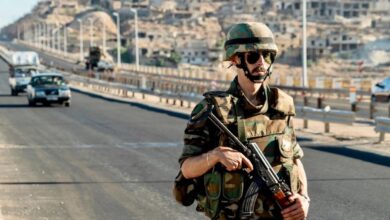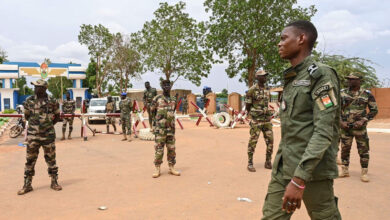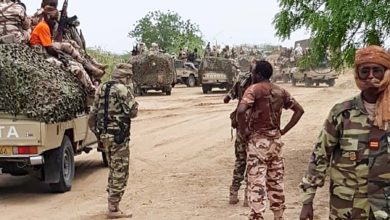At least 20 people were killed and others are missing after militants ambushed a convoy transporting civilians from Sabon Gari to displacement camps in Damboa in northeast Nigeria’s Borno state, according to reports.
Witnesses told the Associated Press that the military was moving civilians to the IDP camps in Damboa when the convoy was ambushed on Saturday, May 26.
A driver told AP that he had seen around 20 bodies and burned vehicles.
Citing two security sources, Reuters reported that at least 25 soldiers and some civilians were killed.
“They ambushed and surrounded the vehicles of both the soldiers and the civilians and opened fire on them,” a militia member told Reuters, adding that fire was exchanged before the “Boko Haram militants overpowered the soldiers.”
AFP sources on Sunday said five soldiers were killed, and blamed the Islamic State West Africa Province faction of Boko Haram.
“We lost five soldiers in the ambush, two were wounded and several are missing, their fate still unknown,” one military officer said.
The officer said the attackers seized two military trucks and tried to immobilise an armoured vehicle by destroying its tyres but the driver managed to drive it to safety.
“As they approached Bungiri village ISWAP laid an ambush on the convoy. The troops engaged the terrorists in a gun battle and all civilians were able to escape but five soldiers were killed,” a second military source said.
Later on Sunday, ISIS propaganda agency Amaq claimed ISWAP fighters “ambushed a Nigerian army force yesterday between the towns of Sabon Gari and Damboa,” killing 15 soldiers and capturing three military trucks. Amaq also released an image that showed six dead bodies, claiming they were Nigerian soldiers.
Damboa town, the headquarters of the Local Government Area, is around 85 km (53 miles) southwest of Borno state capital Maiduguri. Sabon Gari is around 50 km further southwest, towards Biu.
Nigerian Army describes reports as ‘fake news’
The Nigerian Army’s director of public relations, Colonel Sagir Musa denied there were any attacks on military personnel in Borno state on Friday or Saturday, the News Agency of Nigeria reported.
“Contrary to rumor and fake news circulating, there was no attack on any of our troops’ locations at Sabon Gari or any other locations in Borno State,” Musa said in a SMS message.
“I have spoken with the Special Force Commander in Damboa and he confirmed to me that there was nothing of such in Damboa or any of his locations as at Friday and Saturday,” he added.
Residents ‘unilaterally’ moved from Sabon Gari
One survivor told AP that hundreds of civilians and dozens of soldiers were traveling in the convoy, which included as many as 50 vehicles, one source told Reuters.
The Reuters sources said the civilians were being moved from their villages ahead of military operations against insurgents in the area. AFP’s sources also said the evacuations were being carried out ahead of a major military offensive in the area.
On May 21, Major General Benson Akinroluyo, Theatre Commander for Operation Lafiya Dole, the Nigerian military operation against Boko Haram, told reporters that residents of Sabon Gari, were being moved to IDP camps in Damboa, but he did not confirm the relocation was due to military operations.
“It is true we are evacuating residents of Sabon Gari town to Damboa IDPs camp. It is to ensure their safety,” Sun News reported Akinroluyo as saying. “We’ve met the community leaders and the people since yesterday to solicit their cooperation.”
“Humanitarian partners were not informed or involved in the relocation” and it was unclear “whether the affected populations were engaged or informed,” the United Nations Office for the Coordination of Humanitarian Affairs said on May 23, confirming the “unilateral relocation of civilian populations from Sabon Gari.”
According to OCHA, more than 9,000 people live in the Sabon Gari area. By May 23, 7,710 people had been moved after military screening: 3,767 people were relocated on May 21, 2,809 in two batches on May 22, and 1,134 on May 23.
Only 1,427 were hosted in the IDP camps due to limited space. Almost 6,300 people, mostly women and children, were “sleeping in the open without shelters,” and the huge influx of new arrivals has put pressure on food, water and medical provision.

Insurgent attacks in Sabon Gari
There has been an escalation in insurgent attacks in the Damboa and Sabon Gari area in recent weeks.
According to OCHA, the Damboa to Biu road has been temporarily closed, as has Damboa’s weekly market.
Islamic State claimed that fighters from its West Africa Province affiliate on April 13 attacked a checkpoint in Sabon Gari manned by army and militia personnel, saying that three were killed and others injured.

Two weeks later on April 26, ISWAP fighters again attacked Nigerian soldiers in Sabon Gari. ISIS claimed 10 soldiers were killed and another captured. Three days later, security sources told AFP at least five soldiers were killed and around 30 were missing.
The Nigerian military described reporting on April 26 incident as “unsubstantiated” and that the “fake report” was the handiwork of “Boko Haram sympathizers.” Colonel Ado Isa said there were “only minor casualty on own troops,” without specifying casualties.
The Nigerian military seldom comments on the ongoing counter-insurgency operations, and tends to downplay the insurgents’ effectiveness, rarely acknowledging engagements and seemingly understating military casualties and equipment losses.
On May 12, Colonel Sagir Musa said that 117 Task Force Battalion and the Civilian Joint Task Force militia cleared six villages, near Chibok, around 30 km south of Damboa.
The following day, a Boko Haram roadside bomb attack north of Damboa killed three Nigerian soldiers including Lieutenant Colonel Yusuf Ibrahim Aminu. It is unclear which Boko Haram faction was responsible.
The jihadist group known as Boko Haram began its bloody insurgency in northeastern Nigeria in 2009, but it has since spread into neighboring Niger, Chad and Cameroon, prompting a regional military response.
Since 2009, more than 27,000 people have been killed and two million others displaced, sparking a dire humanitarian crisis in the region. On April 30, the U.S. Ambassador-at-Large and Coordinator for Counterterrorism Nathan A. Sales said that the U.S. assesses that Boko Haram and ISWAP “have been responsible for over 35,000 deaths since 2011.”
Boko Haram split into two factions in mid-2016. One, led by long-time leader Abubakar Shekau, is notorious for suicide bombings and indiscriminate killings of civilians. Shekau pledged allegiance to ISIS leader Abu Bakr Al-Baghdadi in March 2015, but ISIS central only gives formal backing to the other faction, which it calls Islamic State West Africa Province.
The ISWAP faction, which largely focuses on attacking military and government targets, was led by Abu Mus’ab Al-Barnawi, but in March, audio recordings revealed that ISIS appointed Abu Abdullah Idris bin Umar, also known as Ibn Umar al-Barnawi, as leader. ISIS has not yet made a public statement confirming the change.
On May 22, ISIS released a video showing ISWAP attacks and the execution of nine people, including one tank crewman who was killed with a rocket-propelled grenade.
The Multinational Joint Task Force, a regional counter-insurgency force comprising personnel from Chad, Cameroon, Niger, and Nigeria, launched Operation Yancin Tafki on February 21 to battle the insurgents. It has said the cross-border operation is aimed at “making islands and other settlements in Lake Chad untenable for Boko Haram Terrorists.”
Nigeria: Islamic State claims Gubio military base attack, releases ISWAP propaganda video
With reporting from AFP. This post was updated multiple times on May 26.












